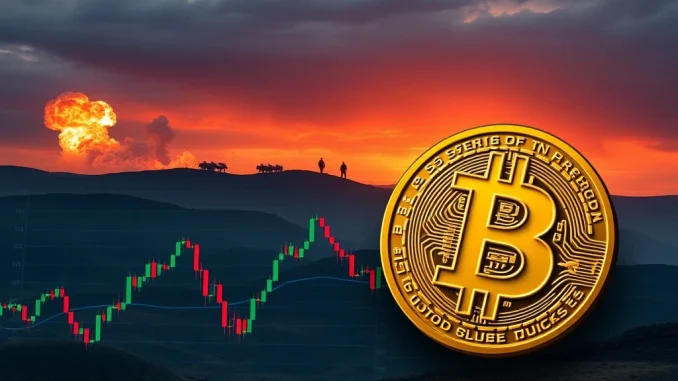
The ongoing **Israel Iran conflict** is capturing global headlines, raising concerns not just about regional stability but also about potential ripple effects across financial markets, including the cryptocurrency space. While the immediate focus is on de-escalation, the uncertainty is already prompting investors to assess **geopolitical risk** and its potential impact on asset prices.
Understanding the Latest in the Israel Iran Conflict
According to reports, Israel has continued targeting Iranian military infrastructure. Officials have indicated a desire to conclude the current phase of conflict relatively quickly. This follows earlier exchanges that heightened tensions significantly.
A key development mentioned is the statement from U.N. atomic agency chief Rafael Grossi. He noted that recent actions against Iran’s Fordow enrichment facility likely resulted in substantial damage. The status of nuclear facilities is a sensitive point in regional dynamics.
Geopolitical Risk and Market Volatility: A Global Concern
Heightened **geopolitical risk** rarely stays confined to one region. Major conflicts or significant escalations tend to introduce widespread uncertainty, leading to increased **market volatility** across traditional financial assets like stocks, bonds, and commodities, particularly oil prices.
Investors often react to such news by moving towards assets perceived as safer or by reducing overall exposure to risk, which can trigger sell-offs in more speculative markets. The interconnectedness of the global economy means that instability in one critical area can send jitters worldwide.
What This Means for Bitcoin Price and the Safe Haven Debate
For cryptocurrency enthusiasts, the key question is how this plays out for digital assets. Historically, periods of global uncertainty have sometimes fueled the narrative of Bitcoin as a **safe haven asset**, a decentralized store of value potentially insulated from traditional financial systems and government control.
However, the reality is more complex. While some investors might turn to Bitcoin during crises, it has also demonstrated high correlation with traditional risk assets like tech stocks. During periods of broad market sell-offs driven by fear, Bitcoin price has often declined alongside other assets.
Factors influencing Bitcoin’s reaction include:
- Overall market sentiment: Is the dominant mood fear leading to selling, or is it a flight to perceived safety?
- Macroeconomic context: Interest rates, inflation, and economic growth prospects still heavily influence crypto markets.
- Liquidity: In times of panic, investors may sell profitable or easily accessible assets like Bitcoin to cover losses elsewhere.
Monitoring the **Bitcoin price** in the coming days will provide more clarity on how the market is interpreting this specific geopolitical event. Is it being treated as a risk-off event causing declines, or is the safe haven narrative gaining traction?
Looking Ahead
The situation remains fluid. While officials express hope for a swift resolution, the potential for further escalation or prolonged tension exists. This ongoing **geopolitical risk** means that **market volatility** is likely to persist in the short term.
For those interested in the crypto market, staying informed about global events and understanding their potential indirect impacts is crucial. The narrative around Bitcoin as a **safe haven asset** will continue to be tested by real-world events like the **Israel Iran conflict**.



